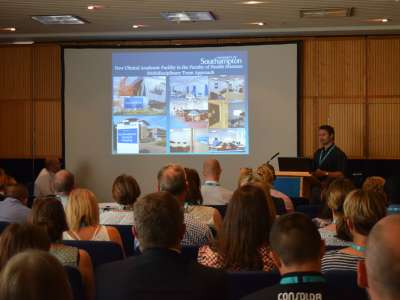
Back in 2014 when I was studying to become a physiotherapist, I never thought I would end up working in the world of wheelchair provision. That’s not to say I was against the idea, it just had never really entered my head – mainly because the topic was not covered as a subject on my course. Neither had I heard of Posture and Mobility Group (PMG) until I began my role within Guy’s and St Thomas’ (GSTT) wheelchair service in 2015! However, since being introduced to PMG, it has become an invaluable resource to me, especially during my early days in the service where the available learning materials really helped me get up to speed quickly.
So I was delighted when I was lucky enough to be awarded a bursary for the PMG Conference 2016 at Birmingham’s International Convention Centre (ICC). It was my first opportunity to attend the annual conference, and I looked forward to the prospect of improving my knowledge of postural management techniques, and the multiple devices utilised in the field. I was also excited about the platform it would provide to build relationships with other professionals, hopefully gaining some valuable advice and insight along the way.
As expected, the presentations throughout the conference were outstanding, and covered a host of interesting topics. I particularly enjoyed Sam Esson’s presentation on 3D printing and its practical applications for wheelchair services. The use of emerging technologies in healthcare is something I find very exciting, so it was of particular interest to hear what potential uses this technique might have. I also enjoyed the parallel sessions delivered by the European Pressure Ulcer Advisory Panel (EPUAP). Pressure management for wheelchair users is something I have to deal with daily in my role, as many of my clients struggle to effectively pressure relieve because of weakness and inhibited sensation. Both of these talks provided me with enlightening viewpoints that could be transferable to my own clinical practice. Photograph of Peter Worsley's presentation on behalf of EPUAP, courtesy of photographer Suzie Hunt.
Given the lack of wheelchair training on my degree course, it was refreshing to be present for Motivation’s session on the World Health Organisation’s (WHO) wheelchair service training packages (WSTPs). WHO have developed a series of training packages that would be beneficial to individuals across the spectrum of wheelchair provision, from volunteers to wheelchair service managers. People from developing nations are often dependent on the donations of equipment from wealthier countries; this inevitably leads to many wheelchairs being issued which are of poor quality, or unsuitable for the client or the environment. Unfortunately it is often the case that staff involved with provision are not always trained adequately to ensure clients with disabilities have a suitable wheelchair; this is something I have seen first-hand on a volunteering trip in Kenya. The main purpose of the WHO training packages is to develop the minimum skills and knowledge required by personnel involved in wheelchair service delivery, which will empower both the patient and clinician to make more informed decisions regarding care.
Motivation feel the WSTPs have a place in the training of the next generation of healthcare professionals in the UK. An important aim is to get the training packages integrated into the syllabus of courses such as physiotherapy, occupational therapy, prosthetics, orthotics and nursing. I feel this would improve the general awareness within the NHS workforce about key risk factors for wheelchair users, and could potentially improve the quality of referrals received by wheelchair services. More information about the WHO learning resources can be found here.
Overall the conference was an absolutely brilliant experience and extremely well run. The opportunities for learning and networking were fantastic and have really allowed me to reflect on my own practices. The staff at the ICC also deserve high praise for their helpful attitude, and for putting on a wonderful gala dinner which went on long into the night. I look forward to more of the same next year!






.jpg)



no comments
Add your comment...